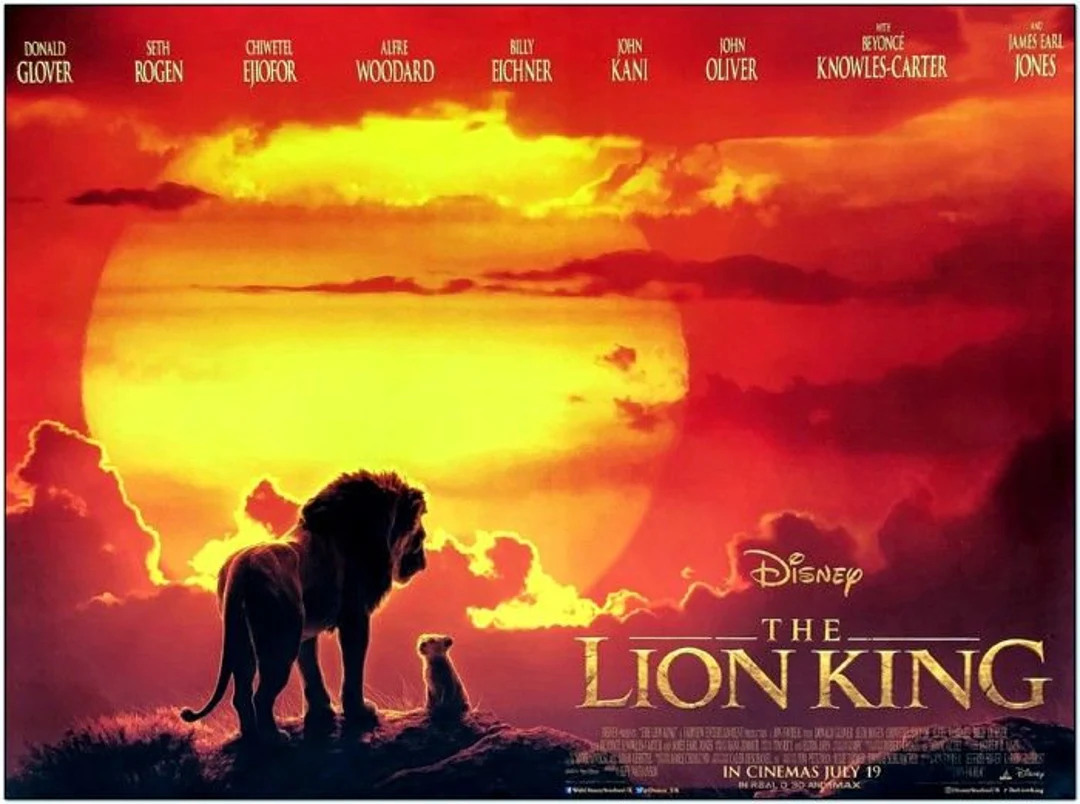The Lion King (2019)

Review: The Lion King (2019) 🦁
Introduction
Released in 2019, The Lion King is a live-action remake of Disney’s 1994 animated classic, directed by Jon Favreau. With groundbreaking visual effects and a star-studded cast, this version of The Lion King brings the beloved tale of Simba, the young lion prince, to life in stunning photorealistic animation. The film follows Simba’s journey of self-discovery, loss, and redemption as he seeks to reclaim his place as king after the death of his father, Mufasa. While paying homage to the original, the 2019 adaptation brings a modern touch to the story, offering both nostalgia and a new sense of grandeur.
Plot and Performances
The plot of The Lion King (2019) follows the same structure as the original, with Simba’s coming-of-age story at the heart of the narrative. Simba (voiced by Donald Glover), the playful and curious heir to the throne, must grapple with the tragic loss of his father, Mufasa (voiced by James Earl Jones), after being manipulated by his uncle Scar (Chiwetel Ejiofor). Forced into exile, Simba eventually returns to reclaim his birthright and restore peace to the Pride Lands.
The performances in the 2019 version are powerful, though the photorealistic animation sometimes makes it harder for the characters to express emotion in the same way as in the animated version. Donald Glover brings a grounded, charismatic portrayal of Simba, imbuing him with vulnerability and determination. James Earl Jones reprises his role as Mufasa, bringing his iconic deep voice back to the role with even more gravitas, evoking the same fatherly wisdom and warmth that made the original character so unforgettable. Chiwetel Ejiofor’s Scar is more menacing and complex, with a depth that adds a layer of moral ambiguity to the villainous character.
Beyoncé voices Nala, Simba’s childhood friend and love interest, bringing her star power and a fierce sense of independence to the role. While her vocal performance is powerful, the character of Nala is given a slightly more prominent role in this version, providing a stronger presence in Simba’s journey. The supporting cast, including Billy Eichner as Timon and Seth Rogen as Pumbaa, offer a much-needed comedic touch, delivering their lines with energy and humor that lightens the emotional weight of the story.
Visuals and Animation
The most striking aspect of The Lion King (2019) is its photorealistic animation. The film’s use of cutting-edge technology to create lifelike animal characters and landscapes is nothing short of breathtaking. The African savannah, the Pride Lands, and the iconic scenes such as the wildebeest stampede are beautifully rendered, with incredible attention to detail that makes the world feel immersive and alive. The animals move with stunning realism, and the use of light, shadow, and texture in the landscapes adds depth to the visual experience.
However, while the visuals are undeniably impressive, the hyper-realistic animal designs sometimes limit the expressive range of the characters. The more subtle emotions, like joy or fear, don’t always come across as clearly on the faces of the animals, which can make it difficult to connect with them in the same way as in the animated version. Despite this, the grandeur and beauty of the visuals still manage to captivate, especially in the film’s larger, more action-packed sequences.
Music and Soundtrack
The soundtrack of The Lion King (2019) is a crucial element in capturing the magic of the original film, and it doesn’t disappoint. Hans Zimmer returns to score the film, bringing his sweeping orchestral compositions back to the Pride Lands. The music elevates key moments, from the emotional depth of Mufasa’s death to the triumphant return of Simba. The score, combined with the classic songs like “Circle of Life,” “Hakuna Matata,” and “Can You Feel the Love Tonight,” brings an extra layer of nostalgia for fans of the original.
Beyoncé’s contributions to the soundtrack are a standout, particularly with the song “Spirit,” which plays a key role in Simba’s emotional journey. The music is uplifting and empowering, perfectly complementing the visuals and themes of the film.
Themes and Emotional Impact
At its heart, The Lion King (2019) deals with themes of responsibility, loss, identity, and redemption. Simba’s journey from carefree cub to responsible king is one of self-discovery and learning to embrace his heritage. The film also explores the circle of life, a theme that has become synonymous with The Lion King. The loss of a loved one, the struggle with guilt and shame, and the importance of leadership and family are central to the film’s emotional core.
While the film doesn’t delve into new thematic territory compared to the original, it does succeed in evoking strong emotions, particularly in the more dramatic moments, such as the loss of Mufasa and Simba’s eventual rise to the throne. The blend of tragedy and triumph creates a deeply moving experience for viewers of all ages.
Conclusion
The Lion King (2019) is a visually stunning remake of a classic film, offering a fresh take on the beloved story while maintaining the emotional resonance of the original. The performances are strong, the animation is groundbreaking, and the music is as iconic as ever. While the photorealistic animation sometimes hinders the characters’ expressiveness, the film still delivers a powerful emotional journey that will resonate with both longtime fans and new audiences. Whether you’re revisiting the story or experiencing it for the first time, The Lion King (2019) is a majestic and heartfelt journey into the heart of the African savannah.











